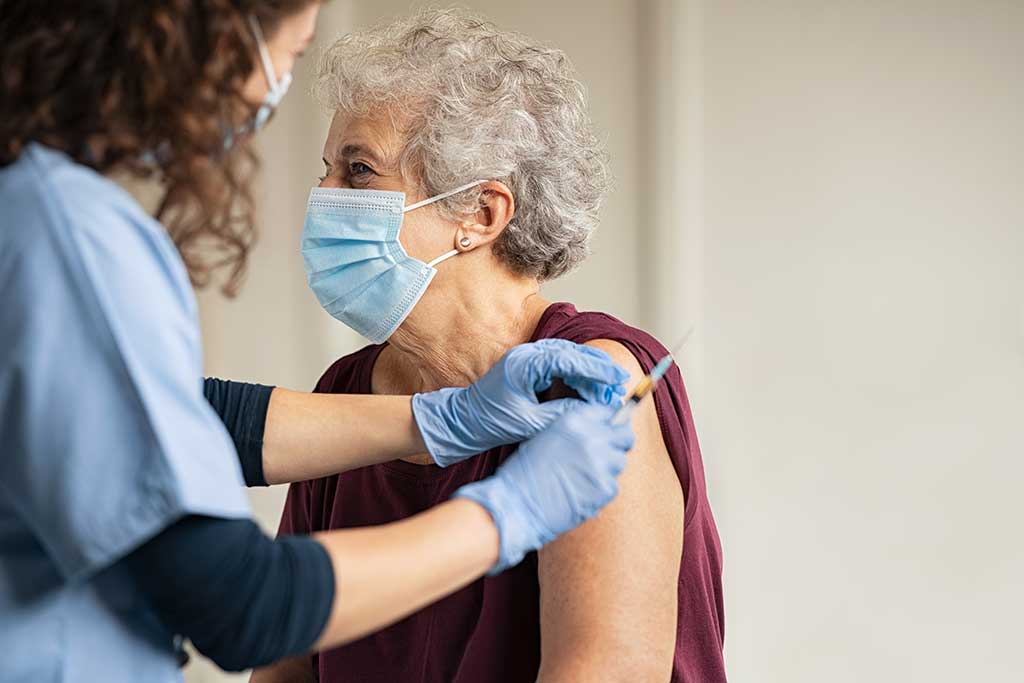
There are three COVID-19 vaccines currently used in the Australian national rollout: Comirnaty®, Spikevax®, and Vaxzevria®. A primary course for each of these vaccines is two doses. However, booster doses have been recently introduced to mitigate against waning immunity and the emergence of new viral variants.
The Therapeutic Goods Administration (TGA) has given provisional approval to Comirnaty® and Spikevax® for use as a booster in individuals 18 years of age and older; booster doses for Vaxzevria® are currently under evaluation. An overview of available COVID-19 vaccines is shown in Table 1.
Table 1. COVID-19 vaccines available in Australia
| Vaccine | Vaccine type | Approved age group | Booster |
| Comirnaty®
(Pfizer) |
mRNA | ≥ 5 years | ≥ 18 years of age |
| Spikevax®
(Moderna) |
mRNA | ≥ 12 years | ≥ 18 years of age |
| Vaxzevria®
(AstraZeneca) |
Viral vector | ≥ 18 years | Under evaluation |
Individuals 18 years of age and older are now eligible for a booster dose five months after completing a primary two-dose vaccination course. Based on the data for primary course completion, approximately 1.7 million people in Australia will be eligible for a booster dose by the end of 2021.
The Australian Technical Advisory Group on Immunisation (ATAGI) updated their recommendations regarding booster doses on 12 December 2021. This advice, which takes into account the likelihood of ongoing transmission of both Omicron and Delta variants, includes:
- A booster dose is now routinely recommended five months after completion of the primary course (previously six months);
- Comirnaty® and Spikevax® are considered equally acceptable and are the preferred vaccines for use as boosters in all eligible groups, including people who received Vaxzevria® for their primary course;
- When used as a booster, Spikevax® is given at half the dose used for the primary course;
- Vaxzevria® is not approved by the TGA as a booster. However, it may be considered for people who have a contraindication to other COVID-19 vaccines or received Vaxzevria® for their primary course; and
- Booster doses are not currently recommended for people younger than 18 years or for immunocompromised adults who have received a third dose as part of their primary course (the Department of Health provides further advice on dosing in people who are severely immunocompromised).
The evidence regarding booster doses is still limited. However, ATAGI advises that available data does support the benefits and safety of booster doses, particularly in high-risk groups. High-risk groups include people with risk factors for severe COVID-19 (e.g. 50 years of age and older, underlying medical conditions, residents of aged care and disability facilities, and Aboriginal and Torres Strait Islander adults) and people with an increased risk of exposure (e.g. occupational risk or outbreak areas).
The vaccine chosen for the booster dose can be different to the vaccine used for the primary course. Clinical trials have investigated the safety and efficacy of heterologous COVID-19 vaccine schedules. Comirnaty® was studied following an initial dose of Vaxzevria®. In this trial, antibody levels were higher when Comirnaty® was used as a booster compared to Vaxzevria®. Another study investigated the use of Spikevax® following an initial dose of Vaxzevria® or Comirnaty®. The Spikevax® booster was shown to be non-inferior to a homologous schedule in this trial. No safety concerns were raised in these studies.
Data is limited on the incidence of rare adverse events following booster doses. For example, myocarditis and pericarditis are rare adverse effects associated with mRNA COVID-19 vaccines. These events are most commonly reported in males under 30 years of age and mostly after the second dose. Preliminary data suggests that a booster dose of Comirnaty® does not further increase the risk of myocarditis.
The definition of ‘fully vaccinated’ for the purpose of compliance with public health orders remains unchanged in Australia. Boosters are not currently required to meet the definition of fully vaccinated as there is insufficient evidence to support a time or specific population in which this should be strictly required.
The advice on COVID-19 vaccine boosters is evolving as more evidence becomes available. Please refer to the Australian Government Department of Health and the TGA for further updates.
References:
- Australian Technical Advisory Group on Immunisation. Australian Technical Advisory Group on Immunisation (ATAGI) recommendations on the use of a booster dose of COVID-19 vaccine. Canberra: Department of Health.; 2021.
- Australian Technical Advisory Group on Immunisation. Australian Technical Advisory Group on Immunisation (ATAGI) recommendations on the use of Spikevax (Moderna) as a COVID-19 booster vaccine. Canberra: Department of Health.; 2021.
- Israeli Ministry of Health, Weizmann Institute of Science, Gertner Institute, Hebrew University, Technion. Vaccines and Related Biological Products Advisory Committee October 14-15, 2021. Meeting Presentation: Booster protection across ages – data from Israel. 2021.
- LiU X, Shaw RH, Stuart ASV, Greenland M, Aley PK, Andrews NJ, et al. Safety and immunogenicity of heterologous versus homologous prime-boost schedules with an adenoviral vectored and mRNA COVID-19 vaccine (Com-COV): a single-blind, randomised, non-inferiority trial. Lancet. 2021; 398(10303): 856-69.
- Stuart ASV, Shaw RH, Liu X, Greenland M, Aley PK, Andrews NJ, et al. Immunogenicity, safety, and reactogenicity of heterologous COVID-19 primary vaccination incorporating mRNA, viral-vector, and protein-adjuvant vaccines in the UK (Com-COV2): a single-blind, randomised, phase 2, non-inferiority trial. Lancet. 2021; DOI S0140-6736(21)02718-5.
Subscribe Knowledge Centre Updates
Enter your details to receive Knowledge Centre updates
